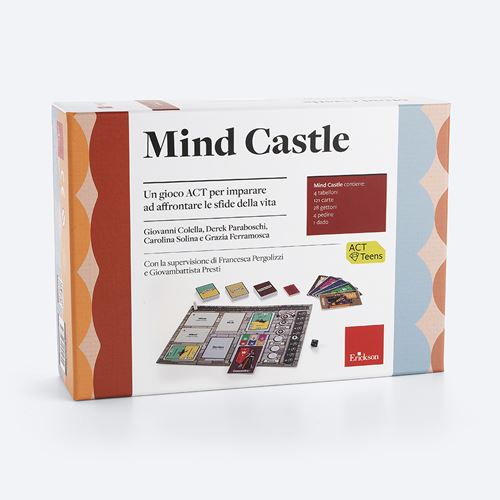 EN
EN
 PT
PT

Acceptance and Commitment Therapy (ACT) is much more than a psychological approach – it’s a pathway that helps people live fully, embracing even difficult emotions and complex thoughts.
Grounded in solid scientific evidence and applicable across both clinical and non-clinical settings, ACT combines acceptance, mindfulness, and committed action to promote psychological flexibility.

Mind Castle
An ACT-based game to help young people face life’s challenges
Giovanni Colella, Derek Paraboschi, Carolina Solina, Grazia Ferramosca
The first board game inspired by the principles of ACT – Acceptance and Commitment Therapy. Set within the walls of a medieval castle, players must navigate tricky decisions and challenging situations. The aim is to support young people in confronting difficult thoughts and emotions — not by avoiding them, but by taking meaningful actions aligned with what truly matters to them.

My P.E.S.C.A. backpack
To understand and manage emotions, thoughts and behaviours
Raffaela Baldino
A useful tool for developmental psychologists and psychotherapists to “break the ice” and facilitate the creation of a therapeutic relationship with children and teenagers, managing typical growth issues: anger management, performance anxiety, the idea of always feeling inadequate.
The acronym P.E.S.C.A. stands for “Thoughts, Emotions, Sensations, Behaviours, Learning”.
THE AUTHORS
Giovanni Colella. Psychologist and psychotherapist, expert in Acceptance and Commitment Therapy (ACT) and neurodevelopmental disorders.
Derek Paraboschi. Psychologist and psychotherapist, uses Acceptance and Commitment Therapy (ACT) in clinical work with adolescents and adults.
Carolina Solina. Cognitive-behavioural psychologist and psychotherapist.
Raffaella Baldino. Psychotherapist, she is part of the ACT Special Interest Group for Kids and Teens of ACT Italia, and is a member of an authorized team for the diagnosis of SLD.